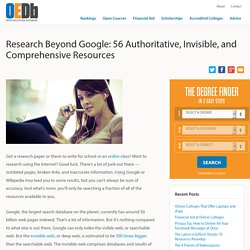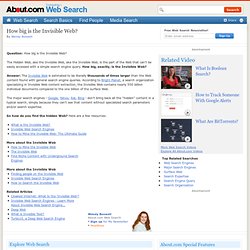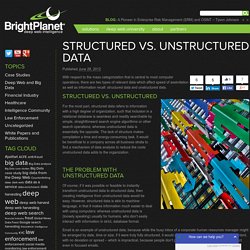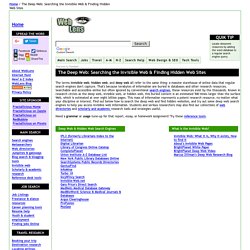

Research Beyond Google: 119 Authoritative, Invisible, and Comprehensive Resources. Got a research paper or thesis to write for school or an online class?

Want to research using the Internet? Good luck. There’s a lot of junk out there — outdated pages, broken links, and inaccurate information. Using Google or Wikipedia may lead you to some results, but you can’t always be sure of accuracy. And what’s more, you’ll only be searching a fraction of all of the resources available to you. Google, the largest search database on the planet, currently has around 50 billion web pages indexed. Do you think your local or university librarian uses Google? Topics Covered in this Article Deep Web Search Engines | Art | Books Online | Business | Consumer | Economic and Job Data | Finance and Investing | General Research | Government Data | International | Law and Politics | Library of Congress | Medical and Health | STEM | Transportation Deep Web Search Engines To get started, try using a search engine that specializes in scouring the invisible web for results.
Art Books Online Business. Discover over 70,000+ databases and specially search engines. Invisible Web Directory - Search The Invisible Web With A Web Directory. Question: How big is the Invisible Web?

The Hidden Web, aka the Invisible Web, aka the Invisible Web, is the part of the Web that can't be easily accessed with a simple search engine query. How big, exactly, is the Invisible Web? Answer: The Invisible Web is estimated to be literally thousands of times larger than the Web content found with general search engine queries. According to Bright Planet, a search organization specializing in Invisible Web content extraction, the Invisible Web contains nearly 550 billion individual documents compared to the one billion of the surface Web. The major search engines - Google, Yahoo, Ask, Bing - don't bring back all the "hidden" content in a typical search, simply because they can't see that content without specialized search parameters and/or search expertise.
So how do you find the hidden Web? Structured vs. Unstructured data. With respect to the mass categorization that is central to most computer operations, there are two types of relevant data which affect speed of assimilation as well as information recall: structured data and unstructured data.

Structured vs. Unstructured For the most part, structured data refers to information with a high degree of organization, such that inclusion in a relational database is seamless and readily searchable by simple, straightforward search engine algorithms or other search operations; whereas unstructured data is essentially the opposite. The lack of structure makes compilation a time and energy-consuming task. It would be beneficial to a company across all business strata to find a mechanism of data analysis to reduce the costs unstructured data adds to the organization. The Problem with Unstructured Data Of course; if it was possible or feasible to instantly transform unstructured data to structured data, then creating intelligence from unstructured data would be easy. The Deep Web: Searching the Invisible Web & Finding Hidden Web Sites: WebLens search portal. Custom Search Locate deepweb resources by adding the word database to a regular search engine query.

The terms invisible web, hidden web, and deep web all refer to the same thing: a massive storehouse of online data that regular search engines don't capture. That's because terabytes of information are buried in databases and other research resources. Searchable and accessible online but often ignored by conventional search engines, these resources exist by the thousands. Known in research circles as the deep web, invisible web, or hidden web, this buried content is an estimated 500 times larger than the surface Web, which is estimated at over eight billion pages. Need a grammar or usage tune-up for that report, essay, or homework assignment?